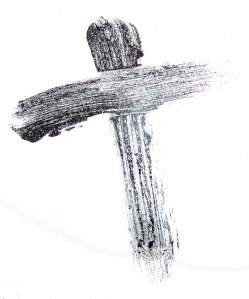
SOURCE: http://www.dioet.org/
As one who has life-long issues with depression I resonate with the sentiment that Lent can be a time to feel even worse. As a Catholic and then a Presbyterian, Lent was a time to feel guilty. Guilty for consuming too much, loving too little, giving not enough, and reinforcing the idea that I am a bad person by some mysterious genetic seed given to me by God through the curse of Adam. It’s enough to drive the clinically depressed to madness – or defiant agnosticism. The latter was exactly what happened.
The reward was a ceremony to remember that God is angry with me for sins I have no real say in eradicating. Nothing I do is actually all that pleasing to God because none of it meets up to His standards. In fact, God can’t even look on me without some disdain for abusing the body and mind that are supposed to be in His image, but are so broken that it’s impossible to reflect it. The Good News is that Jesus stands in the way so that God can’t see me at all. Jesus is my protector from the Bully.
Now whether this is good theology or bad, it was what was the logical place that made sense with what I heard in the teaching I had been given. Jesus substituted his life and received the punishment I deserved for my sinful nature. It’s only because he rose from the dead that God is able to love me at all. Lent was about dwelling in that space of guilt that I cannot do anything to relieve since it is only my faith that Jesus is standing there between me and God that gives me hope I can get to heaven. So I prayed and crossed my fingers.
I entered the communion of the Eastern church a couple of years ago. For the first Lent in which I participated there, I learned that this was not a season to feel guilty, but a season to heal. It is true that I am broken. I have depression, I have been a hopeless drunk, I have a fantastic list of sins that could rival Martin Luther’s. I am imperfect and often feel an unbridgeable gap between my sometimes sordid state of mind and the source of my being in God.
Lent is now about accepting that I have these issues, but these issues are not me. Lent is about focus. It is about honesty and confession. It is about making my life transparent before God and practicing love, justice, and mercy in the world. It is a time to focus on being compassionate and patient towards even those I resent. In fact, it is a time to heal those resentments and apologize to those I may have harmed in the past year. All of these actions are actions of healing myself, my relationships with others, and my relationship with God. My work means something now. I participate in my salvation, rather than close my eyes and cross my fingers that I am not one of those predestined to hell.
The point is that I have a choice to squeeze through the briar patches of life to meet a God who continuously walks through them to meet me in the middle where there is a garden of life.
Lent is about life, not death.
As Monica Coleman writes in her reflection that inspired this post:
Lent gives me the chance to look for those opportunities. It gives me a season – every year – to turn over rocks, crouch down and look under the bed, sweep together the remnants of my last year, of my life, of the current day in search of whatever beauty may be there. It’s my chance to look for the life that can be found in the midst, or something after, death.